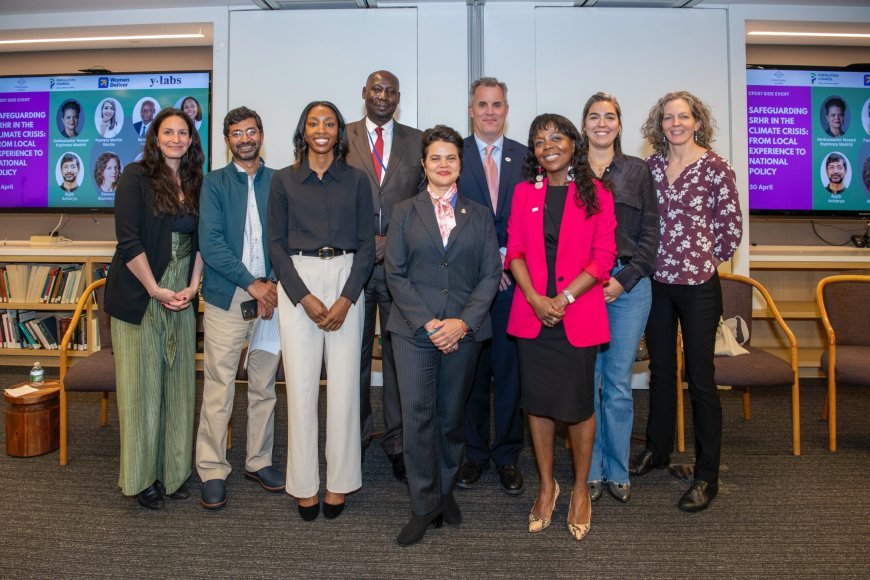Pop Council SRHR x Climate Crisis
During the 57th session of the Commission on Population and Development (CPD57) happening at the United Nations Headquarters in New York City, I moderated a panel that examined the intersections of the climate crisis and sexual reproductive health and rights (SRHR) from several different vantage points. The Population Council, Panorama Global, Women Deliver, and Y-Labs […] The post Pop Council SRHR x Climate Crisis appeared first on Geneva Global.

During the 57th session of the Commission on Population and Development (CPD57) happening at the United Nations Headquarters in New York City, I moderated a panel that examined the intersections of the climate crisis and sexual reproductive health and rights (SRHR) from several different vantage points. The Population Council, Panorama Global, Women Deliver, and Y-Labs convened a panel of practitioners, governments, and advocates who have been working at the nexus of climate, gender, and SRHR.
Some of the main takeaways include:
Many of the issues philanthropy seeks to solve are actually intersectional.
- Many social issues impact marginalized communities in a cascading manner. The effects of the climate crisis can impact a community’s infrastructure, which then impacts people’s ability to access health and education resources.
- For too long, SRHR has been left out of the conversation when it comes to the climate crisis, even though there is data actively collected on the impacts of the crisis on these rights. In addition to the direct impacts the climate crisis has on the physical environment, research conducted by the Population Council highlights some of the indirect impacts it has on the economy, food systems, and access to health care – all of which disproportionately harm the health of women and girls, especially younger generations.
Our approaches to ensuring SRHR and mitigating the climate crisis must be intersectional.
- The need for intersectionality was demonstrated by the makeup of the panel itself. We heard opening remarks from Ambassador Noemi Espinoza Madrid, Ambassador at large and Chair, UN Commission on Population & Development 57
- And remarks from panelists:
- Pamela Martin Garcia, FP2030 Senior Advocacy Advisor, Latin America and the Caribbean
- Samuel S. Omwa, Acting Director General of the National Population Council, Government of Uganda
- Patricia da Silva, Programme Adviser, People of African Descent Initiative, Policy and Strategy Division, UNFPA
- Rajib Acharya, Senior Associate, Population Council
- Eleanor Blomstrom, Ag. Director of Policy and Advocacy, Women Deliver
- Nicole Ippoliti, Technical Director, YLabs
- Both SRHR and the climate crisis need to be approached from perspectives informed by researchers, practitioners, governments, and people with lived experiences related to these issues to create sustainable solutions.
Our funding and resource mobilization towards these issues need to be intersectional.
- Donors and the larger funding community should place just as much emphasis (as we are requesting our partner organizations, NGOs, CSOs, and governments) to not only consider the intersections between sexual reproductive health and rights and the climate crisis but also follow through and shift our funding behaviors and approaches to align with those considerations.
Now this doesn’t mean donors need to change their funding portfolios overnight, but one of the exciting pieces of my work as a Philanthropy Advisor has been witnessing and encouraging more formal and informal donor-peer connections across focus areas. Informally, this looks like facilitating more connections with donors whose interest areas orbit around each other. Formally, this can look like engaging with donor collaboratives and coalitions like the Hive Fund for Climate and Gender Justice and the SRHR & Climate Justice Coalition.
And to be quite frank, the climate crisis impacts all of the work that any of us are doing in ways that are already tracked, documented, and have been shared through this panel. And in ways we haven’t yet experienced. I am coming away from this conversation with the understanding that every actor within this ecosystem (whether you’re a funder, practitioner, researcher, NGO, CSO, or government) needs to consider the nexus of SRHR and climate justice moving forward as the impacts are detrimental and can’t be solved with siloed thinking.
The post Pop Council SRHR x Climate Crisis appeared first on Geneva Global.
What's Your Reaction?




















